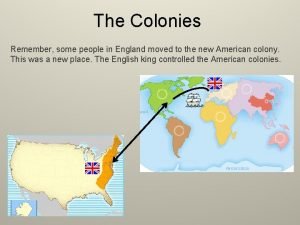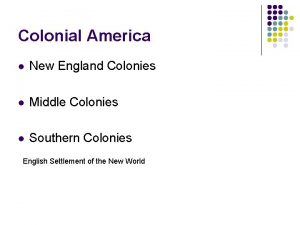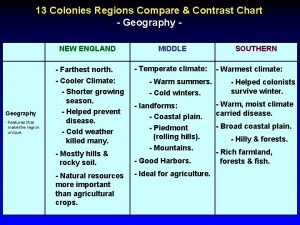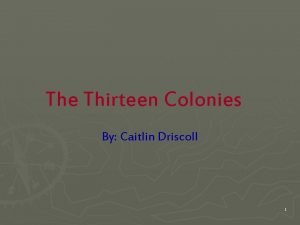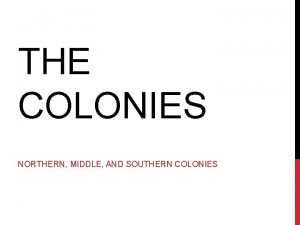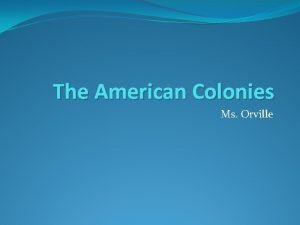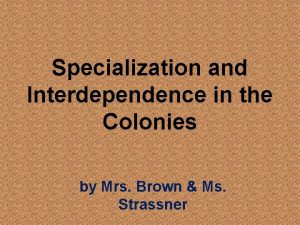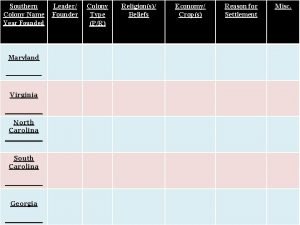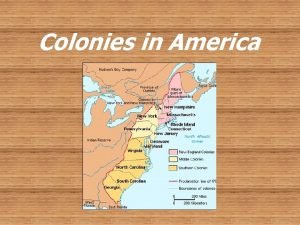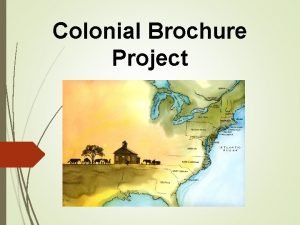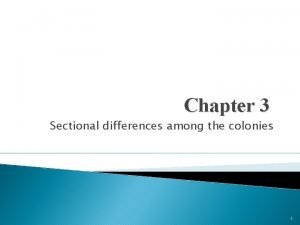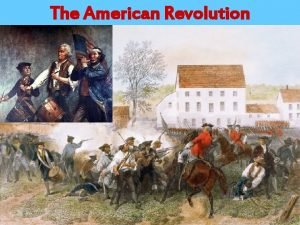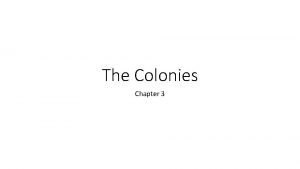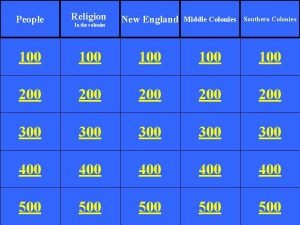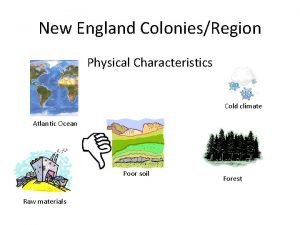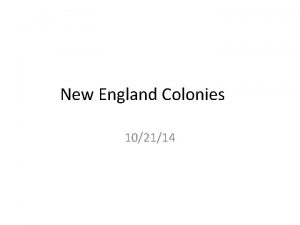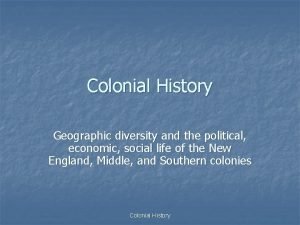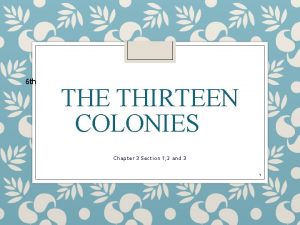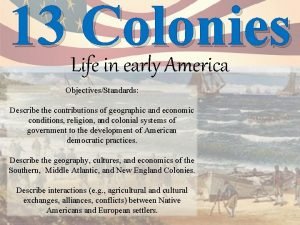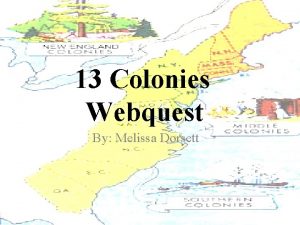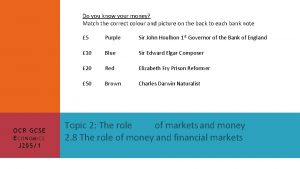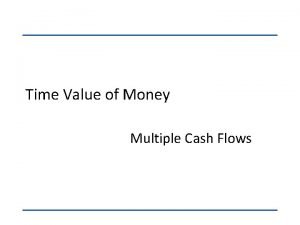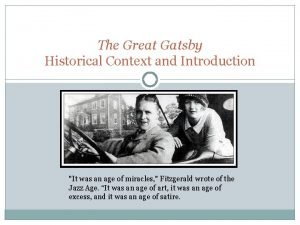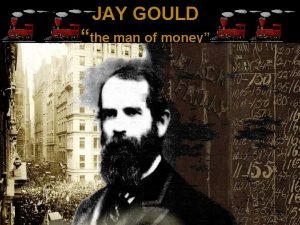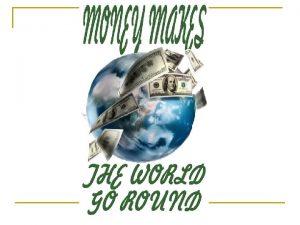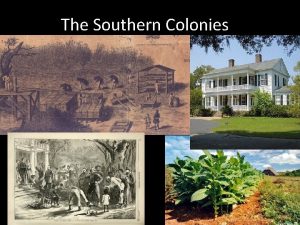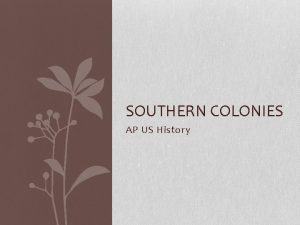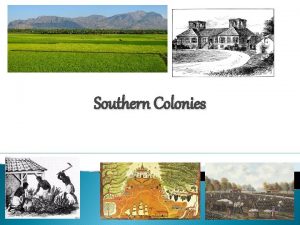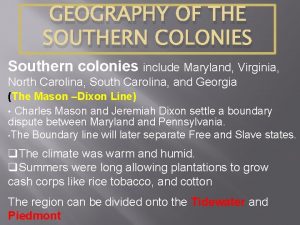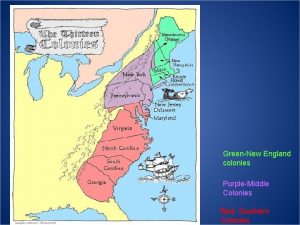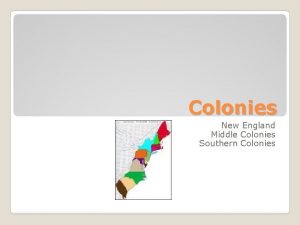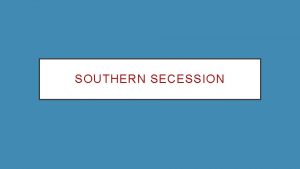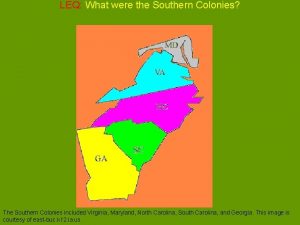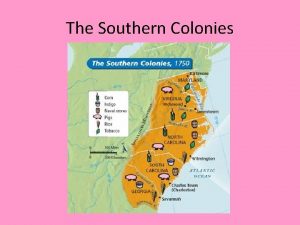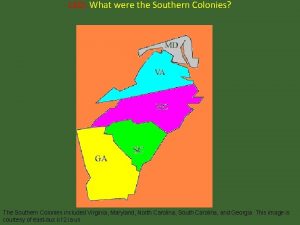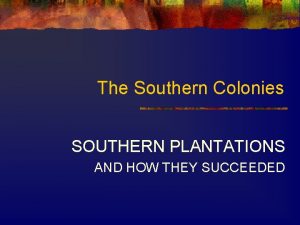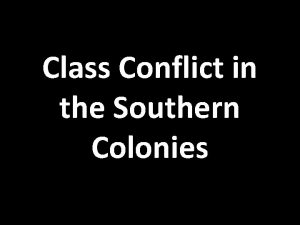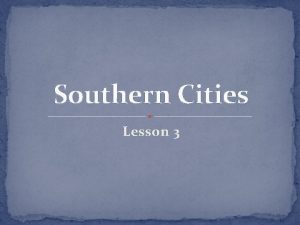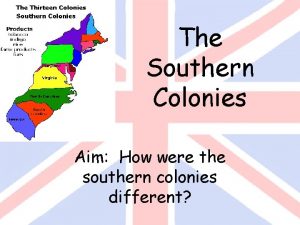Southern Colonies Most colonies created to make money








































- Slides: 40

Southern Colonies • Most colonies created to make money. Maryland also created for Catholics. Georgia as a buffer with Spanish. • Their economy was based on the production of cash crops: • Virginia, Maryland, and North Carolina grew tobacco • South Carolina grew rice, indigo, and sugar cane.

Plantations vs. Smaller Farms • Large plantations dominate agriculture in Virginia, Maryland, and South Carolina. • Much of the land was controlled by a few powerful families • Jefferson, Lee, and Washington • North Carolina had smaller farms and land was divided more evenly.

EOC Question Which colony was established for the purpose of economic profit? a. Massachusetts b. Pennsylvania c. Rhode Island d. Virginia

Southern colonies settled in the Tidewater. Population growth will depend on people arriving from Europe. This area was a swamp and full of disease. Most early settlers will die of diseases like typhus and malaria. There were very few women and families. Population is mostly unmarried males in their late teens.

Before 1700, indentured servants are main source of labor There were few African slaves were too expensive and were too likely to die.

EOC Question Why were large numbers of male indentured servants brought to colonial Viriginia? a. They were needed to defend the colony b. Additional labor was needed to cultivate and harvest tobacco c. Early settlers sought marriageable partners for their daughters d. Their skills were indispensable to the growing shipbuilding industry.

Population of Southern colonies Plantation Owners Former indentured servants Small farmers

Government in Southern Colonies • Colonies were controlled by a royal governor appointed by the king or proprietors. • Virginia’s House of Burgesses was the first legislative, or law-making, body in America • It was composed of mostly large plantation owners • It advised the royal governor • Government was controlled by wealthy plantation owners

Bacon’s Rebellion Most land was owned by plantation owners Indentured servants who finished their service couldn’t find work or land to farm This will lead to a switch to African slaves a source of labor. In 1676, they rebelled against the colonial government and burned Jamestown Slaves will eventually be considered property under the chattel system

New England Colonies • Religion unites the New England colonies • All of the colonies were created to provide religious freedom of some sort • Rocky soil prevented dependence on agriculture • Instead relied on timber and shipbuilding, which led to fishing and trade

Population is made up of families Growth was mainly due to large families with many children Needed many children as a labor source

Cooler temperatures prevented many diseases New England colonists live 10 years longer Children are two inches taller

New England colonies had both indentured servants and slaves, but very few Indentured servants preferred to work in areas that were more profitable Rhode Island was the one exception. Thrived on trading slaves from Africa

Government in New England • First attempt a self-government was the Mayflower Compact. • It was signed by Pilgrims in 1620 before the landed in the New World. • It was a basic agreement that they would form a government that would decide issues based on majority rule, or what most people voted for.

Government in New England • Dominated by the Puritan church • Known as the “Bible Commonwealth” • Only members of the church could hold offices in the colonies • Local politics were dominated by the “town meeting” • All males in the town could speak and vote

Middle Colonies Some colonies founded for profit • New York and New Jersey Pennsylvania founded for religious freedom • Considered the most religiously tolerant colony

Decent soil was perfect for growing wheat and other grains Middle colonies were known as the “bread colonies”

There were some families There were also indentured servants and slaves. Society was a mix between New England the Southern colonies

• England is not the only country with colonies in North America • Spain claims Mexico, Florida, and the Southwest • France claims Canada and the Mississippi River

War breaks out in Europe and Spreads to Colonies in 1754 • France, Spain, and England are fighting for more land in N. America. • More land=More Money • Known as the French and Indian War because France will join with its Native American allies to fight against England

Answer these questions on your papers. . . 1. Why did the European powers fight the French and Indian War? • To gain more territory in North America. 2. Why was it called the French and Indian War? • Because the French allied with its Native American allies to attack the English.

To help with the war, Benjamin Franklin drafted the Albany Plan of Union He wanted to join the colonies together under a central government It was meant to unite the Thirteen colonies against the French Gets rejected, but it is the first attempt to unify the colonies

America’s First Political Cartoon

Ask your neighbor. . . How could the Albany Plan of Union have affected American Revolution? • It will suggest that the colonies could unite together under a central government. Ben Franklin predicted that if it would have worked, there may have never been a revolution.

England is losing the war at first. • William Pitt takes control of the English forces. • He forces colonists to serve in the English army against their will. • He will take supplies for the army from the colonists. • He makes the colonists house and feed English soldiers in their home; this is called “quartering” the soldiers. • Pitts policies turn the war in favor of England.

England wins the French and Indian War Signs Treaty of Paris (1763) that throws France out of N. America

• England issues the Proclamation of 1763, prevents settling further west into the territory taken from the French. • Slows westward expansion

Answer these questions on your paper. . . 1. What effect do you think the Proclamation of 1763 had on the relationship between the colonists and England? • Colonists are angry because they can’t get access to more land. 2. What about the relationship between the Native Americans and England? • Only slows expansion, doesn’t stop it. Also France and Spain continue to encourage Native Americans to attack the colonies.

Impact of the War • First attempt to unite the colonies under the Albany Plan • England spends a lot of money on the war and expects the colonies to help pay it back • Pitt’s policies and the Proclamation of 1763 strain the relationship between England Colonies.

In order to help pay for the French and Indian wars, England (Great Britain) passed laws to make the American colonists help pay for the war. • Sugar Act of 1764 – Taxed sugar from non-English sources. • Stamp Act of 1765 – Certain paper items were required to have a government stamp • Quartering Act of 1765 – American colonists must provide supplies for English soldiers stationed in America. (Had the same policy in England) • Townshend Acts of 1767 – Taxed goods imported from England. • Tea Act of 1773 – American colonists could only purchase tea from England.

Boston Tea Party • Colonists resisted the Tea Act by throwing 92, 000 pounds of English tea into Boston Harbor. • Furious English officials enacted four harsh laws, known as the Intolerable Acts, to punish Massachusetts and set an example for other colonies. • These acts closed Boston Harbor, banned town meetings, increased the power of the royal governor, and allowed the English military to take over Boston.

The Enlightenment • It was the belief that reason and logic could improve government and society. • John Locke believed that the role of government was to protect the “natural rights” of its citizens, who give up some of their rights for this protection. This is known as a “social contract”. • Montesquieu argued that government power should be separated to keep one branch from dominating.

The Enlightenment and American Society • It started in Europe with the upper class, but eventually made its way to the American colonies. • Locke greatly influenced Thomas Jefferson and Benjamin Franklin. • The Declaration of Independence and the Constitution will contain ideas borrowed from Paine. • He wrote “Common Sense”, which openly encouraged the American Colonies to separate from England.

The Great Awakening • The Enlightenment caused some of the American colonists to question their religious beliefs. • Some American colonists strayed from or abandoned their religion. • Church leaders feared that American colonists had become preoccupied with making and spending money.

The Great Awakening • In 1730, ministers like Johnathan Edwards began the Great Awakening with sermons like “Sinners at the Hand of an Angry God” • Jonathan Edwards was a Puritan minister who believed that the American colonists had strayed from the church. • He used sermons about Hell to scare people back to the church.

The Great Awakening

The Great Awakening • This was a major religious revival in the colonies. • It made church accessible to people and church membership grew. • This helped to further separate the American colonists from England.

• Boston was most affected by the Intolerable Acts. • Citizens in the city protested English laws and oppression frequently. • One of these protests ended in the English opening fire on protestors, killing five. • Greatly angered American colonists, convincing many that rebellion was the only answer. The Boston Massacre

First Continental Congress • In 1774, representatives from 12 colonies met to discuss growing problems with England. • They agreed to issue a Declaration of Rights to protest English actions in America. • They created a militia to defend American colonists should war break out with England. Known as “minutemen”.

“Shot Heard Round the World” • Hearing about the Continental Congress, the English generals decided to capture the colonial leaders and part of the gunpowder that the militia had been storing. • Paul Revere and others managed to warn everyone. • They fired on some minutemen who had gathered to stop them at Lexington, Massachusetts. They killed eight. • The English then fought the minutemen at Concord, Massachusetts and retreated back to Boston. • This is the beginning of the Revolutionary War.
 Dana damian
Dana damian The northern colonies
The northern colonies Religion southern colonies
Religion southern colonies L
L Characteristics of the southern colonies
Characteristics of the southern colonies Compare and contrast graph
Compare and contrast graph Southern colonies
Southern colonies Economy of southern colonies
Economy of southern colonies Northern middle southern colonies
Northern middle southern colonies Southern colonies
Southern colonies Southern colonies specialization
Southern colonies specialization Southern colonies founder
Southern colonies founder Southern colonies
Southern colonies Colonial brochure
Colonial brochure Economy of southern colonies
Economy of southern colonies Southern colonies
Southern colonies Southern colonies entertainment
Southern colonies entertainment Chapter 3 lesson 4 the southern colonies
Chapter 3 lesson 4 the southern colonies Southern colonies society/culture
Southern colonies society/culture When was the new england colonies founded
When was the new england colonies founded Southern colonies
Southern colonies Southern colonies definition
Southern colonies definition Southern colonies religion
Southern colonies religion Southern colonies physical characteristics
Southern colonies physical characteristics New england, middle and southern colonies comparison chart
New england, middle and southern colonies comparison chart Southern colonies geography
Southern colonies geography Southern colonies
Southern colonies Economy of middle colonies
Economy of middle colonies New england mid atlantic and southern colonies
New england mid atlantic and southern colonies Melissa dorsett
Melissa dorsett Slash and burn agriculture
Slash and burn agriculture Jordan baker golf
Jordan baker golf Money smart money match
Money smart money match Money on money multiple
Money on money multiple The great gatsby historical context
The great gatsby historical context Context of the great gatsby
Context of the great gatsby How do banks make profit
How do banks make profit How did jay gould make his money
How did jay gould make his money Make your money grow
Make your money grow Does money make the world go round
Does money make the world go round Make an analogy comparing energy and money
Make an analogy comparing energy and money
